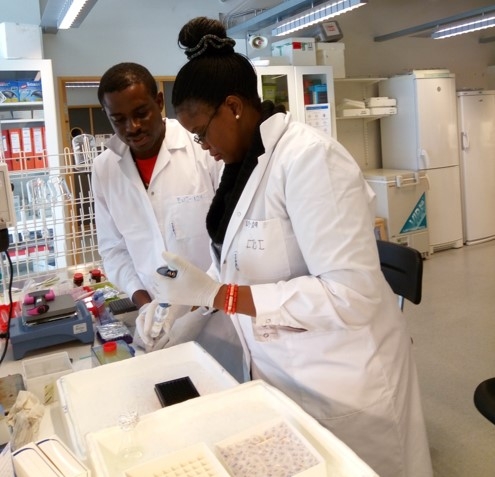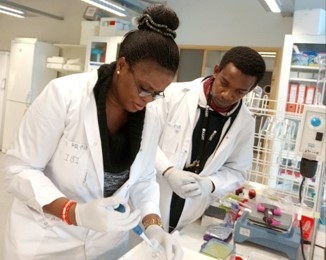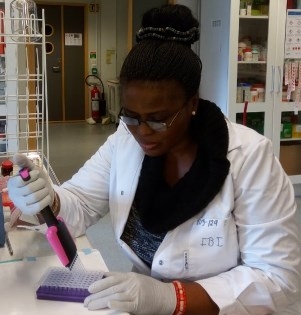Note: the next Global Senior Scholar application deadline is June 15.
I attended my first Society of Toxicology (SOT) Annual Meeting in 2013 (San Antonio) and became a member of SOT afterward. Prior to this meeting, I had a lot of difficulty in establishing international collaborations with leading toxicologists in my field.
The 2013 Annual Meeting afforded me the opportunity to meet with leading toxicologists, particularly at the Toxicologist of African Origin (TAO) Special Interest Group meeting. Subsequent discussions resulted in a vibrant and ongoing collaboration with Prof. Augustine Arukwe of the Norwegian University of Science and Technology (NTNU), Trondheim, Norway. Prof. Arukwe has been very committed to raising awareness about toxicology in Africa and he was invited as the keynote speaker for the 2014 Departmental of Zoology, University of Ibadan, Seminar series titled “Molecular and Cellular Responses to Endocrine Disrupting Chemicals in the Environment: The Past, The Present and Future” in August 2014.
Prior to this, I had no publications in high impact journals such as those published by Elsevier because there was no high throughput instrumentation to carry out research at my University. My interaction with Prof. Arukwe through SOT has resulted in 14 publications in high-impact journals such as Science of the Total Environment, Aquatic Toxicology, Marine Environmental Research, Comparative Biochemistry and Physiology, Chemosphere, General and Comparative Endocrinology, and Journal of Toxicology and Environmental Health. Through these publications, we have provided novel data on the molecular basis of endocrine disruption and obesity in tropical wildlife species, especially food fishes, and developed protocols for monitoring contaminant exposure. These biomonitoring protocols for environmental management were hitherto not available in the Africa region. This experience has resulted in my receiving an invitation to be an African representative on a global ‘omics group and I am currently a reviewer for a number of high impact journals.

With Dr. Richard Ibor, my former PhD student and now a postdoctoral fellow at NTNU
I visited Prof. Arukwe´s laboratory with two of my PhD students in 2014 and 2015. One of them (Dr. Oju Richard Ibor) completed his PhD in 2016, is a lead author in two high impact journal articles, and currently is a postdoc fellow at NTNU by grants from the African Research Excellence Fund (AREF). These students also have attended SOT Annual Meetings in 2014 and 2015, and they have been recipients of SOT and TAO travel awards. To date, we have over 10 publications in highly reputable peer-reviewed journals emanating from our research collaboration with Prof. Arukwe because of attending the SOT 2013 Annual Meeting.

With my PhD student Emmanuel Dami Omogbemi preparing samples for enzyme assay analysis in fish liver samples
The award of 2018 Global Senior Scholar and the opportunity provided by SOT for me to visit Prof. Arukwe’s lab this spring made it possible for one of my PhD students, Emmanuel Dami Omogbemi, to be with me here at NTNU to complete the molecular aspects of his PhD dissertation titled: “Biotransformation and growth responses in the Tongue sole, Cynoglossus senegalensis, from the oil-polluted Ilaje coastal area of Ondo State.” There is little information on the response of this benthic sentinel species to pollutants. We hope to contribute critical information in the understanding of sediment contaminant interaction in this fish.
We are also in the process of submitting a manuscript on endocrine disruption in the black jaw tilapia, Sarotherodon melanotheron, in Lagos lagoon. This will be a first report on the molecular basis of endocrine disruption from this very important southern lagoon off the Gulf of Guinea in Nigeria.
We are looking at how to integrate an Experimental Ecotoxicology course at NTNU into our final year undergraduate BIO 416 Toxicology course. Models for other aspects of this course taught at the graduate level at NTNU also have been provided to us by Prof. Arukwe, and we are in the process of reviewing our graduate courses in Ecology and Environmental Biology and Fisheries to incorporate standardized protocols used in molecular biology to our graduate program curricula.
Prof. Arukwe will be visiting our University in July and will be interacting with our graduate and undergraduate students, particularly final year undergraduate students who will be assigned research topics soon. It is our belief that this will be very valuable for them to learn more about research methodologies, outcomes, and interpretations of data in molecular biology and practical aspects of Ecotoxicology.
Through efforts during my sabbatical leave of absence (2016–2017) at Obafemi Awolowo University (OAU), Ile-Ife, Nigeria, faculty and students of the Department of Zoology learned about SOT and SOT activities. Toxicology was introduced as a new course into the final year Zoology course curriculum. I have been in talks with the department towards organizing a one-day seminar to be delivered at OAU by Prof. Arukwe on emerging trends in environmental contaminants during his visit to the University of Ibadan. It is our intention that this will create more awareness about SOT and toxicology in the Southwest region of Nigeria.

Dr. Adeogun applying substrates for fish enzyme analysis
One of my greatest satisfaction with the SOT Annual Meeting and Global Senior Scholar Award is the opportunity it has provided me to achieve my dream of mentoring graduate students from Nigeria who are now becoming early career scientists and have better opportunities at securing postdoctoral positions to further contribute to the African and global scientific community through research.